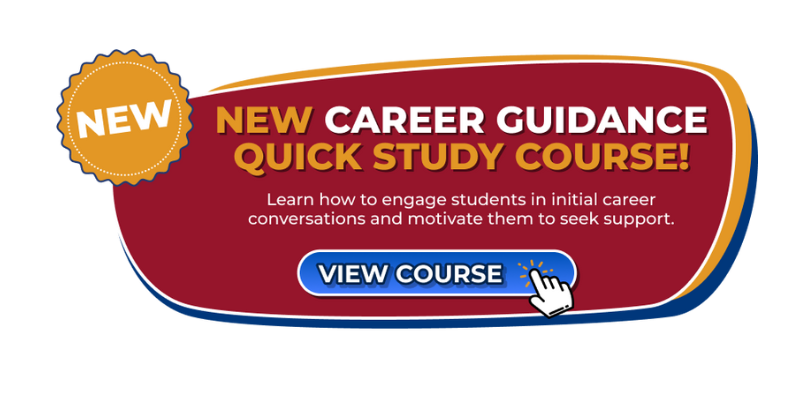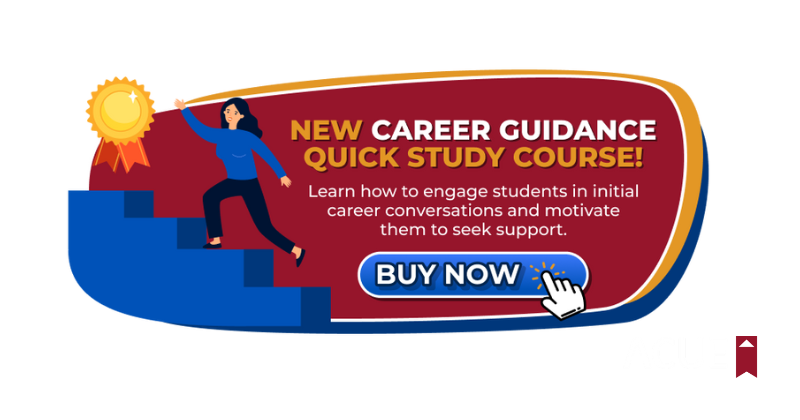
Integrating Career Guidance: A Must-Have for Today’s Classrooms
Integrating Career Guidance: A Must-Have for Today’s Classrooms

In today’s rapidly changing job market, the demand for graduates ready to hit the ground running has never been greater.
Colleges and universities are under increasing pressure to ensure students leave with the knowledge, skills, and experiences necessary to secure fulfilling careers. Meeting these expectations requires campus-wide support, including faculty being prepared to weave career guidance seamlessly into their courses, showing a clear commitment to student success and career readiness.
The research underscores this need, with 77% of faculty agreeing that higher education institutions should prioritize career preparation and nearly 75% recognizing it as part of their role to support students professionally (NACE). Integrating career guidance practices into courses can help institutions strengthen their reputations by preparing graduates to thrive in their careers, while enriching students’ learning experiences and providing them with the essential skills and knowledge for future success.
Let’s explore the ways integrating career guidance practices into courses can benefit students, faculty, and institutions.
1. Enhanced Student Engagement
When faculty integrate career guidance into their teaching, it bridges the gap between classroom learning and real-world application.
Learn More
Students are more motivated and engaged in their studies when they see how their coursework relates directly to the workplace. This helps students understand the relevance of their learning, motivating them to connect with the material in deeper ways.
As students learn to apply theoretical concepts in practical situations, they better understand course material. This connection to real-world applications fosters a greater sense of purpose, transforming academic studies into a foundation for future career success.
2. Boosting Career Readiness
Career readiness is more than just an outcome; it’s a critical component of the learning process.
Learn More
By building career guidance into academic programs, institutions empower students to develop essential skills, including communication, teamwork, and problem-solving—qualities employers consistently seek.
Furthermore, when faculty provide insights into industry trends and specific employer expectations, students gain a clearer understanding of the skills they need to thrive. Faculty members can offer insights into evolving career requirements, helping students prepare effectively for current and emerging job markets.
3. Informed Decision-Making
Career exploration is essential for students who may feel uncertain about their goals or lack exposure to diverse career options.
Learn More
When faculty share potential career paths related to their area of expertise, they open the door for students to consider a broader range of opportunities that they might not discover on their own.
Also, by initiating career-focused conversations with students, faculty can help students reflect on their interests and goals while guiding them to valuable on-campus resources like the career center. This support empowers students to make more informed decisions about their future career paths.
4. Meeting Students Needs
An inclusive approach to career guidance addresses the unique challenges faced by many student populations.
Learn More
Students, particularly those from low-income backgrounds, may benefit from more access to career resources or professional networks. Providing career guidance in the classroom ensures that all students have access to career resources to move ahead no matter where they come from.
Additionally, continuous career guidance supports adaptability in a fast-paced job market, equipping students with the resilience to adjust their career paths and skills to meet evolving demands.
5. Bridging Academia and Industry: Building Career-Ready Graduates
To achieve these goals, partnerships with businesses and industry organizations can offer insight into real-time labor market needs.
Learn More
Higher education can better tailor programs to match workforce demands, providing students with clear pathways to job opportunities and career advancement.
For example, the City University of New York (CUNY), in partnership with the New York Jobs CEO Council, brings employers into the conversation. This yearlong program connects faculty with industry professionals to redesign curricula that embed career competencies directly into coursework.
6. Strengthened Institutional Reputation
Institutions that integrate career guidance into academic programs build a reputation for prioritizing student success and employability.
Learn More
By actively preparing students for meaningful careers, colleges and universities are committed to providing a solid return on investment (ROI) for students and families.
Successful career outcomes also contribute positively to alumni relations, with graduates likely to engage with and support their alma maters, fostering a community of success and networking opportunities for future students.
Preparing Students for Lifelong Success
By embedding career guidance into the academic fabric, faculty can prepare students for their career and foster a lifelong approach to professional growth and adaptability. This commitment to career-focused education aligns with a more holistic vision of higher education’s role in society: nurturing well-rounded individuals ready to thrive in dynamic, evolving industries.
As students graduate with both knowledge and practical career competencies, they enter the workforce as confident, capable professionals who embody the value of their education. This, in turn, strengthens the institution’s reputation, attracts prospective students, and creates a cycle of success that fuels both individual and community progress. In an era where the ROI of higher education is closely examined, institutions prioritizing career readiness stand out as leaders, proving that the future of education is deeply connected to the future of work.
Eager to explore how to successfully integrate career guidance into your curriculum?
We’re thrilled to share that ACUE is launching three new Career Guidance Quick Study courses! The first course, Embedding Career Guidance into Your Course, is available now, with two more courses set to launch in 2025.
The Embedding Career Guidance into Your Course Quick Study equips faculty with strategies to engage students in initial career conversations. These conversations will motivate students to seek support from the campus career center and help them understand how internships can shape their future!



